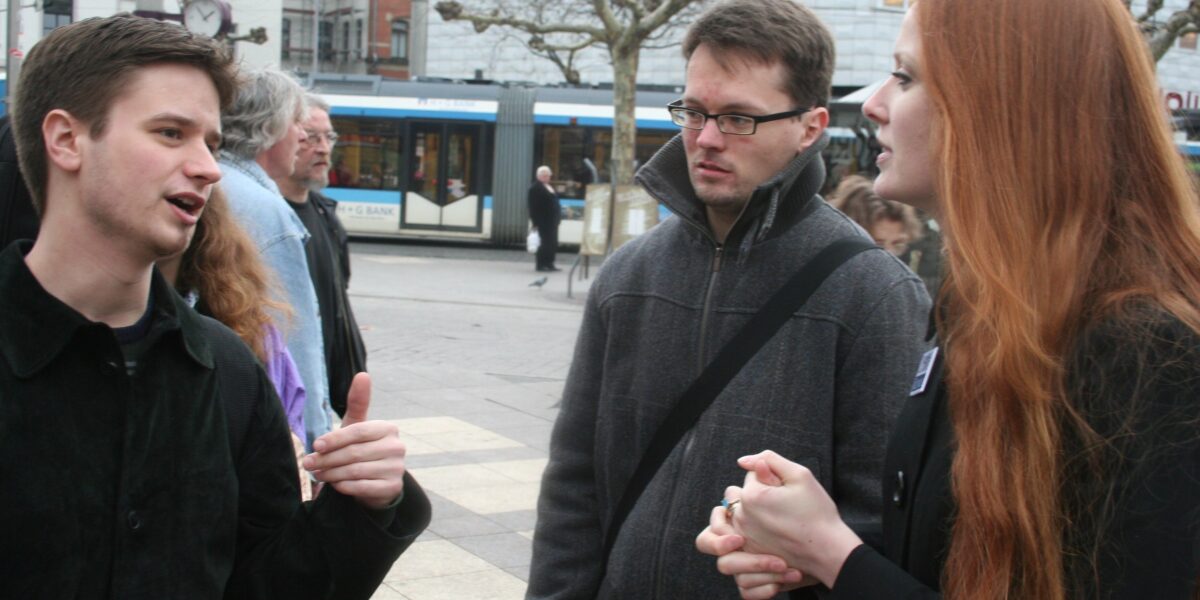As the five-year anniversary of Michael "MJ" Sharp’s murder approaches, a new book by Marshall V. King, Disarmed: The Radical Life and Legacy of Michael "MJ" Sharp, traces Sharp’s journey from his childhood to his death on assignment with the United Nations Group of Experts. This piece originally appeared in the January 21 issue of Anabaptist World, alongside an excerpt from Disarmed and an interview with Sharp’s parents, John and Michele Miller Sharp.
To watch an interview with King at Waterford Mennonite Church, Sharp’s home congregation, click here.
Dramatic stories of sacrificial Anabaptist peacemaking tend to be historic, even centuries old. One of the most recent of these stories is shared in Disarmed: The Radical Life and Legacy of Michael "MJ" Sharp, by Marshall V. King.
King tells the story of the former Mennonite Central Committee (MCC) and Mennonite Mission Network worker who was murdered in 2017, while he was investigating atrocities in Congo for the United Nations. The five-year anniversary of his death is in March.
"We hear the stories of 1-W service and Pax and conscientious objectors during the World Wars, and here is a story of a man who was doing peacemaking work, first as part of Mission Network, then MCC and then the United Nations," King said in a Dec. 2 interview from his home in Goshen, Indiana. "And while he was practicing this Anabaptist peacemaking theology, he was also trying to figure out what it means to be Mennonite in the modern world.
"I saw it as a really good story of someone who had answered the call to be a peacemaker and inevitably put himself at risk — someone who was willing to take risks on behalf of other people and inevitably lost his life because of it."
King was drawn to the story of the young Mennonite who picked up his things and went off to practice pacifism in ways many others only talk about.
Sharp, through his Mission Network assignment with Military Counseling Network, helped members of the U.S. military pursue conscientious objection discharges in Germany.
He worked with Rwandan refugees as the Eastern Congo coordinator with MCC.
He sat with militia commanders to discuss conflict over cups of tea as part of a program that persuaded roughly 1,600 fighters to lay down their weapons.
Then, he and his U.N. colleague, Zaida Catalán of Sweden, were kidnapped and fatally shot while investigating human rights abuses and sanctions violations in Kasaï-Central Province.
"He ended up losing his life," King said. "At the time — and it’s still true — this was as close as a Mennonite might get to the knock on the door that a lot of military families experience."
King hit the road in 2017 to interview people who had been close to Sharp. His travels took him from Indiana to Kansas, New Mexico, Canada and, ultimately, to Europe, where he spent time with Catalán’s family in Sweden.
"I stayed in a room that was his in Bammental," said King, speaking of Sharp’s Germany placement with the Military Counseling Network, a project of the German Mennonite Peace Committee. "I wanted to go to Congo, but then, there was election unrest, then Ebola, then COVID-19, so I never went there. And there were different opinions on if I could safely go to report on this story."
King was impressed by the number of people around the world who had stories to share about Sharp’s impact on their lives.
"I’ve read the press clips, and there’s a lot in this book that has not been reported on MJ Sharp," King said. "One of the things I worked to do in the book was to put MJ into context. Where would MJ sit with addressing the question of whether he was a martyr? Whether MJ was a hero?"
"Using what people told me about him, [I worked] to put him into the contexts of historic Anabaptism and Mennonites in the 21st century, as well as the larger human tale of how we live our lives in a divided world."







